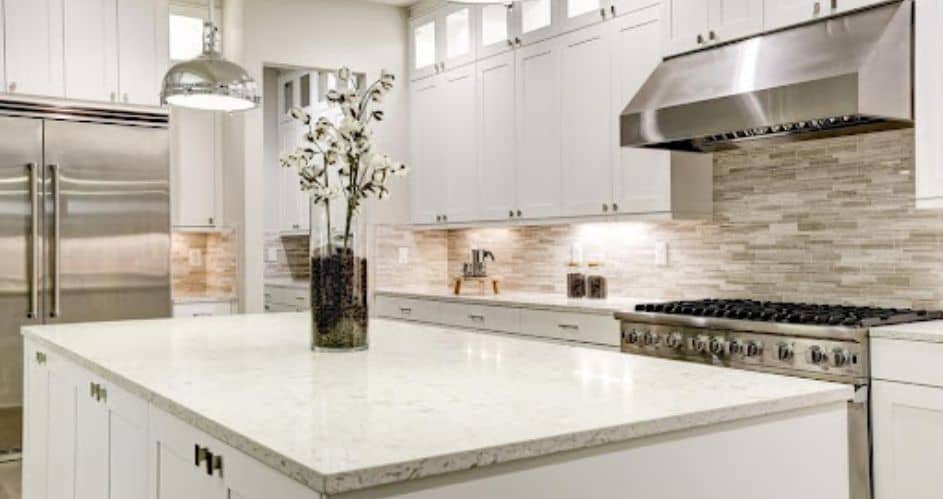
If you’re remodeling your kitchen, new countertops can significantly impact the look, feel and usability of your space. Countertops come in a wide range of materials, colors, patterns and price points to complement your custom or RTA cabinets.
Your tastes, budget, cooking habits and lifestyle determine which surface best meets your needs. These seven considerations can help you make the right choice.
1. Aesthetics
A harmonious, inviting kitchen needs beautiful countertops that complement your backsplash, cabinetry and vinyl plank flooring. The material and finish of your worktops contribute to the overall ambiance of the space.
If your kitchen is minimalist or modern, consider pairing simple polar white cabinets with smooth quartz, solid-surface or laminate countertops in lighter tones.
Butcher block, marble, concrete and granite countertops could look great in traditional or rustic kitchens. We recommend balancing textured surfaces or busy patterns with a simple decor scheme that keeps the space feeling lively and pleasant.
2. Durability
If you’re investing in a kitchen remodel, you’ll want to make sure it’s going to withstand damage from utensils and heavy items. The most durable kitchen countertops are made from long-lasting, hard materials that are heat, crack, warp and scratch-resistant.
Few countertops have all of these qualities, so finding the right balance for your needs is essential. Solid surface materials, for instance, rarely crack but scratch easily.
Granite, tile and quartz are usually the hardest and most heat-resistant countertop materials, while laminate and wood can be prone to warping. Hard, natural stone countertops that can be repaired or refinished tend to be the most durable over time.
3. Stain Resistance
Although no countertop is completely stain-proof, many countertop materials are highly stain-resistant. Non-porous materials like granite and quartz that resist scratching, abrasion and chemical interaction are less likely to change color, texture or sheen when they come into contact with liquid or food.
Chemicals, acidic foods and oils can stain countertops if their surface is absorbent or reactive. Sealants can act as a protective barrier against stains. The smoother, less porous, and more hydrophobic the material, the more stain-resistant it will be.
Laminate and unsealed concrete, wood and stone may discolor if they are not kept clean. Heat can also leave scorch marks on laminate and synthetic solid surface countertops.
4. Antimicrobial Surfaces
You’ll likely be handling uncooked eggs, raw meat and potentially germy materials in your kitchen from time to time. Antimicrobial countertop materials help keep your kitchen surfaces free of unwanted bacteria, viruses and mold.
Less-porous quartz and stainless-steel countertops are among the most sanitary because they won’t absorb liquids and bacteria. You can even coat some countertops with an antimicrobial sealant that will inhibit the growth of germs and mildew.
The best part is that you don’t have to sacrifice style for enhanced safety. These sealants are typically available in matte or semi-gloss finishes.
5. Low-Maintenance Composition
Low-maintenance countertops are easy to clean and rarely, if ever, need sealing or refinishing. They are inexpensive to repair or replace as needed. Laminate countertops are not the most durable, but they wipe down easily, never need sealing and can be replaced at a low cost.
Solid-surface countertops are also stain-resistant and easy to clean with soap and water. Quartz is another elegant, non-porous, low-maintenance option. Materials like granite, marble and wood may need more frequent oiling or resealing to fend off stains.
6. Budget-Appropriate
As you narrow down your countertop selections, it’s important to consider your budget. Countertop materials are typically priced by the square foot, so the size you need may factor into your decision.
Tile and laminate countertops are generally the least expensive, while solid-surface worktops cost a little more. Quartz, granite, wood and stainless steel often carry premium prices.
7. Usability
Your kitchen worktops need to be functional, practical and good-looking. The way you cook will help you discover what kind of countertop you need.
Think about how often you cook and if you are more likely to cause damage with hot pots, sharp knives, or colorful, oily, or acidic foods, wines, and condiments. Ultimately, your cooking ingredients, practices and routines will determine the best countertop material for you.
A Great Countertop Is the Finishing Touch Your Kitchen Deserves
The countertops are arguably the most visually defining part of a kitchen. But that doesn’t mean you should feel too much pressure in making a selection. Choosing new countertops can be one of the most enjoyable parts of creating a kitchen you love.
The best way to pick out a kitchen work surface is to research your options and choose a material that will hold up to your cooking style and look great with your walls, floors and cabinets. With a little effort, you’re sure to find a countertop that will serve you well for years.
